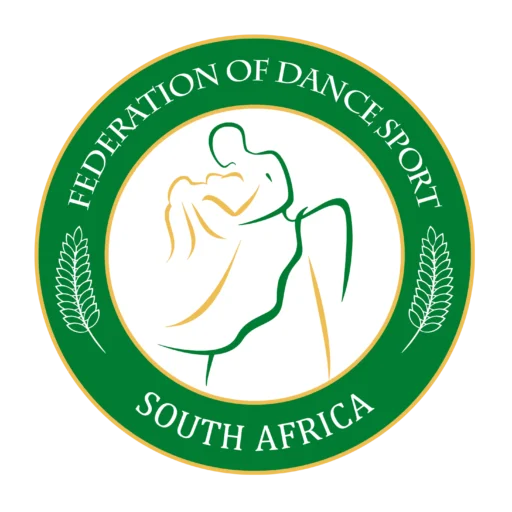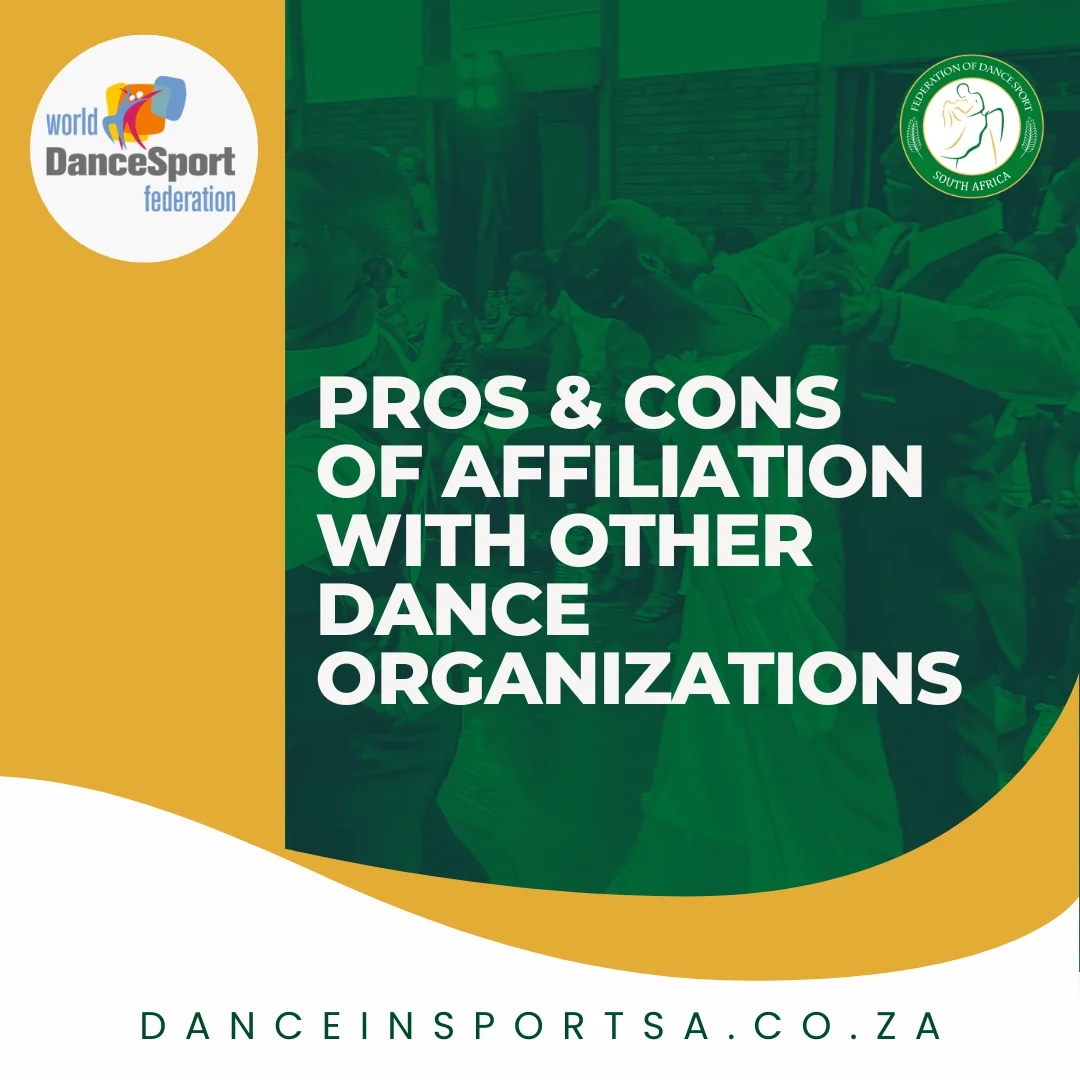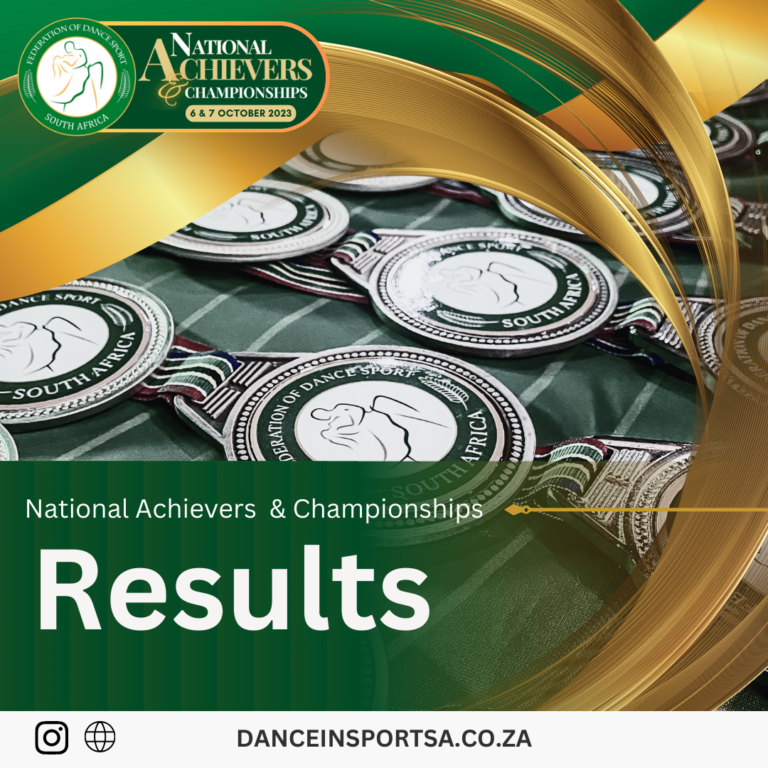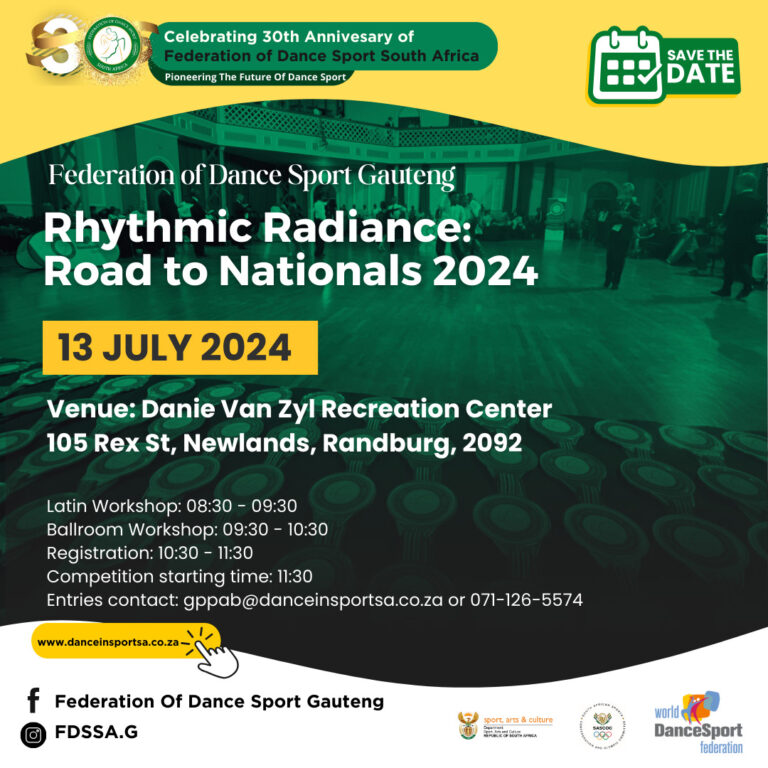Dear Delegates and Officials,
Regarding affiliation with other dance organizations, we understand that you may have received correspondences, and we acknowledge that it can be confusing. As WDSF management, we prioritize evaluating the pros and cons of affiliations, focusing on the future of WDSF and considering both short-term conveniences and long-term implications. To provide clarity, we have prepared an information sheet to offer a balanced perspective on the matter.
ADVANTAGES
1. Event organizers can invite and work with some renowned dance professionals affiliated to other organizations. This could be beneficial to some, in particular, Standard and Latin training camp organizers.
OUR VIEW: We acknowledge the appeal. We also respect renowned dance professionals from all organizations, and warmly welcome them to join WDSF if they have not already done so.
In our perspective, you can still invite these “big names” anyway, by paying a professional fee, as you would to all invited trainers. Many of the training camp organizers in the WDSF are already doing so, so there is no need to be a member of another organization to invite more dance professionals.
2. WDSF Adjudicators might be invited to officiate at the competitions of other
organizations.
OUR VIEW: This does not seem open to all in the WDSF – rather, it is only a selected handful of WDSF officials, possibly ones with direct personal connections to other organizations.
To our knowledge, there seems to be a larger number of trainers of other organizations being invited to WDSF-affiliated camps and competitions, rather than WDSF officials being invited to the events of other organizations. Would benefits be one-sided?
3. WDSF athletes get to compete in a larger variety of competitions organized by various dance organizations.
OUR VIEW: This sounds lovely, but it comes with a price.
Firstly, we understand that many of you at the AGM today are competition organizers, and we value your hard work in organizing great national and international events.
From observation and experience, we see that National Member Bodies (NMB) who support events of other organizations might suffer a lack of support and participation of athletes at their own events.
This is not because event organizers are not running good events; rather, it is in human nature to want to try new experiences and therefore competitions.
In reality, athletes will be dispersed to multiple competition events from different organizations. Especially when competitions from different organizations are run during the same week, there will inevitably be fewer participants at one event.
On an athlete level, it could cause confusion to the athletes about which competitions to attend.
On an economic level, this can cause critical financial problems to event organizers.
On an organizational level, you might find more difficulties with structuring your ranking systems.
DISADVANTAGES
1. Losing the Right to be the Governing Body of DanceSport at the National Level; Membership and Economic Challenges
WDSF is the only world governing body of DanceSport recognized by the International Olympic Committee (IOC), which is the sole leading, prestigious, global, governing body of sports.
We have encountered two incidents when other dance federations claimed to be the governing body in attempt to take over WDSF’s recognition by the IOC, and our Presidium has dedicated tremendous efforts to protect our NMBs and WDSF.
Furthermore, by increasing affiliation to more organizations, is a significant risk of losing your athletes who have grown to be part of the WDSF system. You can imagine many economic challenges would shortly follow.
2. Maintaining WDSF’s Image as an Olympic Sports Federation
First, we keep our doors open to people from other federations who want to join WDSF and be part of the WDSF system.
While “freedom” is valued, we must maintain a systematic and accountable approach for efficient work. Clear regulations are necessary to prevent the loss of values and reputation if not managed carefully.
3. Differences in Values and Priorities, especially in promoting DanceSport as a Sport
Inevitably, there will be conflicts in ideologies. For example, in anti-doping and dress regulations for the athletes and officials to create the best sporting image.
4. Decreased Competition Participation
It is common to see WDSF events and other organization competitions on the same day or week. Although it is beneficial to have more events to promote the sport in general, under todays’ financial challenges of organizing large-scale events, such affiliation will likely create unnecessary conflict among organizers to promote their events.
5. Challenges to our Existing Competition System
Our competition system is growing, as you can see from many new events that have been added to evolve with the times.
Event organizers can only run a limited number of competitions in a year, and growth must be in a systematic manner. Immediately affiliating or merging with different organizations that may have different ideologies and regulations will result in a confusion and disruption to our existing system that aims to be efficient and organized.
CONCLUSION
Consider the immense effort we have invested to secure our position as the only sports body recognized by the International Olympic Committee (IOC) worldwide. It took six decades to achieve inclusion in the Olympic Games, starting with one discipline but with the potential for more in the future. WDSF must be prepared to ensure readiness for additional disciplines if we are to seize this opportunity.
The advancement of DanceSport lies in its association with sports. Such alignment supports sports development through partnerships with National Olympic Committees and similar organizations. Should the national body give up its role as the NOCrecognized governing body for DanceSport for the sake of immediate convenience and short-sightedness?
If you look back at the “Advantages” list on the first page, we believe most benefits from affiliation to other organizations are largely material and short-term benefits.
It is important to note that we are not suggesting we cease collaboration with organizations that can benefit us. However, we must not surrender our status as the governing body, as doing so would jeopardize the position of WDSF as an Olympic Sports Federation.
Ultimately, the IOC is the sole leading global sports organization, we do not want to risk losing our position as the sole governing body of DanceSport recognized by the IOC, which comes with numerous economic benefits to our NMBs.
Lastly, we must remain united in our efforts so that our decades of hard work do not go to waste. We must remember our values as a sporting organization. Ultimately, freedom is a desired ideal, but freedom needs to come with clear structure and a long-term approach to planning our steps to growth.
The WDSF Managing Committee





